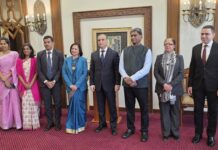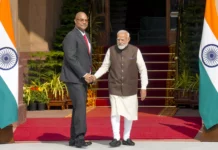
NEW DELHI: External Affairs Minister Salman Khurshid says “serious concerns” have “piled up” in Indo-Pak ties in the backdrop of recent incidents, including killing of an Indian prisoner, which Pakistan will have to address before the two countries pick up “strands” of the composite dialogue.
With various Indo-Pak interactions scheduled in past few months, including at the level of Water Secretaries, being cancelled in the aftermath of the beheading of an Indian soldier along the LoC in January, he said, “We have a composite dialogue which will have to be picked up again”.
Asked what were his expectations from the new government in Pakistan, Khurshid said, “There are some serious concerns that have piled up over the past few months and obviously some of those concerns will have to be addressed if we need to take all people in the country with us.
“It is important to have people supporting any initiative that is taken further”.
He underlined that the composite dialogue has contours that both countries have decided are the best way to proceed.
“And that composite dialogue is essentially based on the idea of confidence building and resolving those issues that are possible to resolve and not getting into intractable issues that might take much longer to resolve,” Khurshid told PTI in an interview.
“Obviously, that is where we will start off once again,” he said.
Khurshid noted the positive comments that Pakistan Prime Minister-designate Nawaz Sharif made including on speeding up the Mumbai attack case trial there, not allowing the use of Pakistani soil for anti-India activities and the need to build peace with India.
“But these are signals given before he takes charge of the office of the Prime Minister and takes on board issues that are pending.
“We would like him to settle down in his new job and then take up strands from where we left off,” he said.
Cooperation with Saudi Arabia
Asked about the counter-terrorism cooperation with Saudi Arabia, which he visited, Khurshid said, “My last meeting was with the Minister for Internal Security who is very, very upbeat on India and who wants much more to happen between India and Saudi Arabia in terms of engaging on issues of counter terrorism”.
He said he had also flagged the issue of cyber security during the meeting with the Saudi Minister “on which he said he is completely on board”.
“He thinks that we have a shared destiny and he certainly sounded to me as a person who feels strongly for India,” he said.
On the Saudi stand on Afghanistan and the red lines that India says should be adhered to while negotiating a peace deal with the Taliban, he said, “I think they are quite happy with the red lines”.
The international community had earlier drawn red lines under which those wanting to join talks had to abjure violence, cut links with the extremist groups and follow the Afghan constitution.
Khurshid said Saudis wanted to know in greater detail about India’s view and perception “which again is broadly there but we are still waiting for more clarity to take place”.
“We don’t know how the Afghan-driven peace process with Taliban will finally pan out. Whether the Doha office for this purpose is going to get activated and whether the Taliban will explicitly and specifically commit themselves to the red lines,” he said.
He said that Afghan President Hamid Karzai during his visit to India “wasn’t in a position to give details because I think it is still work in progress”.
“We have said to Saudi that we would be very happy to closely engage with them, we would like to keep in touch with them and as things develop and as things become more obvious, we can then pick up the pieces of our discussion,” he said.
Khurshid added Saudis “did not seem to have strong conclusive views”.
“Their engagement and closer engagement with Afghanistan have been sought by the Afghan govt and I think they are still making up their mind on how to proceed and learning from experiences of countries like India who are already there in a big way,” he said.
Asked how many people are expected to return to India from Saudi Arabia due to the controversial ‘Nitaqat’ law, Khurshid said, “We are working on this. It is still too early.
May be some thousands people, few thousand people will come back.”
He stressed that the grace period of three months given to expatriates to regularize their papers is a generous offer.
“It is such a generous offer that we have that people who are unable or have been unable to live with their original sponsors can be in the market place to be picked up by other sponsors and that process is going on.-PTI






